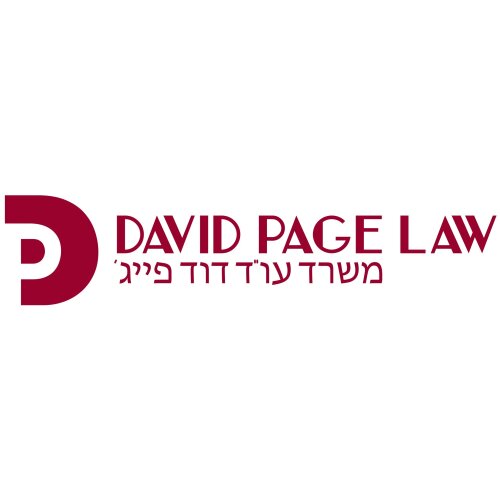Best Restructuring & Insolvency Lawyers in Israel
Share your needs with us, get contacted by law firms.
Free. Takes 2 min.
Or refine your search by selecting a city:
List of the best lawyers in Israel
About Restructuring & Insolvency Law in Israel
Restructuring and insolvency law in Israel governs the processes by which companies and individuals can address severe financial difficulties, whether through rehabilitation, liquidation, or the reorganization of debts. These laws aim to balance the interests of debtors, creditors, employees, and the broader economy. In Israel, the legal framework focuses on providing opportunities for companies to recover and continue operations, when possible, while also ensuring equitable solutions for creditors when liquidation is unavoidable.
Why You May Need a Lawyer
Legal advice in restructuring and insolvency cases is crucial due to the complexity and sensitivity of these matters. You may need a lawyer if you find yourself or your business unable to meet financial obligations, receive demands from creditors, face bankruptcy threats, or if you wish to restructure your organization to avoid insolvency. Lawyers can also assist creditors in recovering debts, represent stakeholders in insolvency proceedings, and help navigate negotiations, court procedures, and compliance with local regulations.
Local Laws Overview
Israel's restructuring and insolvency regime is governed by the Insolvency and Economic Rehabilitation Law, 5778-2018, which came into force in September 2019. This law significantly reformed the previous insolvency framework. The law provides detailed guidelines for both individual and corporate insolvency, emphasizing the rehabilitation of debtors and transparent, fair processes for all parties. Key aspects include court-supervised rehabilitation agreements, creditor arrangements, bankruptcy orders, and the appointment of trustees to manage debtor assets. Recent reforms aim to expedite proceedings, protect employees, and promote economic recovery.
Frequently Asked Questions
What is insolvency?
Insolvency occurs when an individual or company is unable to pay their debts as they become due. In Israel, this status can apply to both individuals and businesses, triggering legal processes aimed at resolving the financial distress.
What is the difference between restructuring and liquidation?
Restructuring involves reorganizing a company's debts and operations to restore financial health, often allowing the business to continue. Liquidation, in contrast, results in the sale of assets to repay creditors and the closure of the business.
Are there alternatives to bankruptcy in Israel?
Yes, Israeli law supports rehabilitation and creditor agreements that may allow debtors to avoid bankruptcy by negotiating payment arrangements or restructuring their operations under court supervision.
Can individuals file for insolvency, or is it only for companies?
Both individuals and companies can file for insolvency in Israel. The law provides distinct procedures and protections for each, taking into account their specific circumstances and the scale of debt involved.
How are creditors’ interests protected during insolvency proceedings?
Creditors are involved in the negotiation and approval of restructuring plans, and they have the right to receive updates, propose alternatives, and challenge decisions that might harm their interests. The appointment of a trustee or administrator ensures that the process is fair and transparent.
What happens to employees during insolvency?
Israeli law provides certain safeguards for employees, including prioritizing unpaid wages and social benefits in the distribution of a debtor’s assets during insolvency proceedings.
How long does the insolvency process usually take?
The timeline varies depending on the complexity of the case, whether restructuring or liquidation is pursued, and court schedules. Some proceedings can conclude in several months, while others may take years.
Can I keep my assets if I declare insolvency?
Some assets may be protected or exempt from liquidation, depending on their nature and the specifics of your case. However, most non-essential assets are typically used to satisfy creditor claims.
What are the consequences of insolvency for directors or owners?
Company directors and owners may face restrictions on business activity and may be subject to legal scrutiny if misconduct, fraud, or negligence is suspected in relation to the company's financial distress.
How do I start the insolvency or restructuring process in Israel?
The process usually begins with a formal application to the court, supported by detailed financial documentation. Legal counsel is recommended to ensure compliance with procedures and maximize the chances of a favorable outcome.
Additional Resources
Several organizations can provide further information and support regarding restructuring and insolvency in Israel:
- The Israeli Ministry of Justice - Insolvency and Economic Rehabilitation Division
- The Official Receiver (Rasham Hapisul)
- Israeli Bar Association
- Business support centers and local chambers of commerce
- Financial consulting and debt management organizations
Next Steps
If you are facing financial difficulty or contemplating insolvency or restructuring, it is essential to seek professional legal advice as early as possible. Start by gathering your financial documents, making a list of your assets and liabilities, and noting key events or deadlines. Schedule a consultation with a lawyer who specializes in restructuring and insolvency law in Israel. Your lawyer can assess your situation, explain your rights and options, and guide you through court procedures. Taking timely action and securing specialist advice can help protect your interests, minimize losses, and provide clarity for the future.
Lawzana helps you find the best lawyers and law firms in Israel through a curated and pre-screened list of qualified legal professionals. Our platform offers rankings and detailed profiles of attorneys and law firms, allowing you to compare based on practice areas, including Restructuring & Insolvency, experience, and client feedback.
Each profile includes a description of the firm's areas of practice, client reviews, team members and partners, year of establishment, spoken languages, office locations, contact information, social media presence, and any published articles or resources. Most firms on our platform speak English and are experienced in both local and international legal matters.
Get a quote from top-rated law firms in Israel — quickly, securely, and without unnecessary hassle.
Disclaimer:
The information provided on this page is for general informational purposes only and does not constitute legal advice. While we strive to ensure the accuracy and relevance of the content, legal information may change over time, and interpretations of the law can vary. You should always consult with a qualified legal professional for advice specific to your situation.
We disclaim all liability for actions taken or not taken based on the content of this page. If you believe any information is incorrect or outdated, please contact us, and we will review and update it where appropriate.
Browse restructuring & insolvency law firms by city in Israel
Refine your search by selecting a city.












